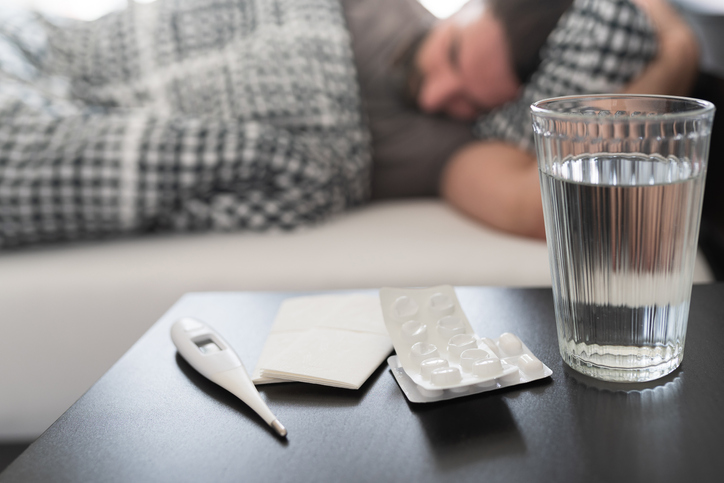People will soon be able to get a COVID-19 test they can administer at home and get rapid results, but they’ll need a doctor’s prescription to do so and their physician will have to submit patient information to third parties.
The test, known as the Lucira COVID-19 All-n-One Test Kit, received emergency use authorization by the U.S. Food and Drug Administration (FDA) on November 17. Developed by Emeryville, California, based biotech company Lucira Labs, the single-use molecular test kit can deliver results in 30 minutes or less.
Lucira expects the kit to cost about $50 and to be available nationwide by spring 2021 through providers. Unlike other FDA-approved diagnostic kits that allow people to self-collect a sample at home, Lucia’s is the first kit that provides results at home without having the sample processed by an outside lab. Individuals can also get the rapid test at a point-of-care setting, like a hospital or doctor’s office, but it must be administered by a health care provider.
Individuals must be age 14 or older and have a prescription for purchase. Additionally, FDA made it clear that “prescribing healthcare providers are required to report all test results they receive from individuals who use the test to their relevant public health authorities in accordance with local, state, and federal requirements.”
In a statement, FDA Commissioner Stephen M. Hahn, M.D., described the test kit as “an important diagnostic advancement to address the pandemic and reduce the public burden of disease transmission.”
A Game Changer?
As the number of confirmed cases continues to rise – reaching a daily average in mid-November of nearly 160,000 new COVID-19 cases — public health officials will welcome an in-home procedure that simplifies the task of identifying people infected by the virus. An effective at-home test kit would greatly reduce the workload on already overstretched labs and other healthcare facilities.
The test could also have an impact on behavior. Jeff Shuren, M.D., J.D., director of FDA’s Center for Devices and Radiologic Health, said in a statement that people “will be able to take immediate action, based on their results, to protect themselves and those around them.”
From the earliest days of the pandemic, the FDA recognized the importance of reliable in-home testing but also expressed concerns over whether people could safely and properly collect nasal specimens for a COVID-19 diagnosis. However, the FDA’s Shuren said that a diagnostic test that “can be fully administered outside of a lab or healthcare setting has always been a priority” for the agency.
Similar to an at-home pregnancy test, the consumer will have to collect a sample of bodily fluid. The Lucira test uses a swab to take a sample from the nasal cavity, which is then swirled in a vial. A display then shows whether a person is positive or negative in as short as 11 minutes.
Can the Public Understand?
A positive test result may not indicate an accurate COVID-19 diagnosis. The EUA specifically prohibits the company from suggesting or representing that “this test is safe or effective for the detection of SARS-CoV-2.”
It is that limitation that worries Twila Brase, R.N., P.H.N, and president and co-founder of Citizens’ Council for Health Freedom and policy advisor to The Heartland Institute, which co-publishes Health Care News. “The public, believing the test is a sure-fire route to discover whether they have COVID-19 may view themselves as COVID-positive when they don’t actually have the disease,” said Brase.
Brase says she also has concerns about some 27 elements of information physicians are required to report to public health agencies and the test manufacturer. “Will patients be told their test results, plus other identifying information, must be reported to government authorities? Informed consent is key because it does not appear, they’ll be given a choice, if they use the test,” said Brase.
There are other questions involving the reporting requirements. The test may involve increasing a provider’s workload or potential for liability if the patient doesn’t complete the test or is reluctant to turn in results.
The test will likely be used by individuals who must encounter someone who is immune-suppressed, says Erwin Haas, M.D., an infectious disease specialist and policy advisor to The Heartland Institute. “I don’t see how it will seriously affect COVID -19 transmission, given the low incidence of clinically healthy individuals carrying the virus and/or being contagious.”
A similar point was made by Michael Mina, a professor of epidemiology at Harvard’s T.H. Chan School of Public Health, who has been critical of the wide-scale use of PCR testing in controlling the pandemic.
Mina told healthcaredive.com on November 18, there has been no “serious guidance” by FDA or the Centers for Disease Control and Prevention on how these tests could be deployed and used on a nationwide scale. “I worry that we are going to have a haphazard rollout of them,” stated Mina.
Bonner R. Cohen, Ph.D., (bcohen@nationalcenter.org) is a senior fellow at the National Center for Public Policy Research.
